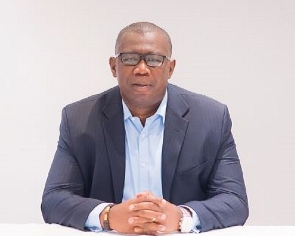The Chief Executive Officer of the Petroleum Commission (PC), Egbert Faibille, says the commission will not relent in its efforts to ensure full compliance with the country’s local content laws.
According to him, the Commission’s insistence on local content, was provided for by law saying that “partial compliance is no compliance.”
He was speaking yesterday at the ninth edition of the annual Local Content Conference and Exhibition (LCCE) in Takoradi in the Western Region, on the theme, “10 years of Local Content in Ghana’s Upstream Petroleum Industry: Achievements, Challenges and Prospects.”
Organised by the Petroleum Commission, the conference is aimed at promoting local content and local participation in the petroleum sector in accordance with Legislative Instrument (L.I) 2204.
It also marks the 10th year of the passage of the Petroleum Local Content and Local Participation Regulations, 2013 (L.I.2204), designed to maximise the patronage of Ghanaian goods and services, increase in-country-spend and employment of Ghanaian professionals.
Citing Regulation 49 of L.I. 2204, Mr Faibille said, “local content is the quantum of percentage of locally produced materials, personnel, financing, goods and services rendered in the petroleum industry value chain and which can be measured in monetary terms.”
He expressed dissatisfaction about some companies not operating according to the law saying that “regrettably, some companies operating in our upstream environment have sought to operate beneath the obligation to do local content as enshrined in the law.”
The Commission, Mr Faibille said, would strengthen its internal vigilance to bring the desired results of the law to the country.
Similarly, he said, the Petroleum Commission would support companies and investors who show commitment to meeting their local content obligations.
The Commission, he added, had developed a strategy paper as to how Ghana could ensure that seismic and other petroleum data were made available for the use of investors for enhanced exploration and production activities.
Over the last ten years, he said, the upstream petroleum businesses had improved significantly since L.I. 2204 was passed, stating that , in 2021, contracts awarded to Indigenous Ghanaian Companies (IGCs) surged from approximately US$7 million in 2020 to approximately US$14 million.
There was a further leap on this figure to approximately US$157 Million (72 contracts) in 2022 representing an over 1,000 per cent growth, Mr Faibille added.
He said joint ventures also witnessed significant growth over the period by “growing over 650 percent from approximately US$51 Million in 2020 to US$336 Million in 2022.”
Ghana, he noted, presently had six blocks that needed investments revealing that three, namely, the Offshore Cape Three Points South Block, the Shallow Water Cape Three Points Block and the South West Saltpond Block were available for investments by way of direct negotiations with the Minister for Energy.
Western Regional Minister, Kwabena Okyere Darko-Mensah, called on all stakeholders to work with government to ensure that the local content policy and law was fully operational and adhered to.
Business News of Thursday, 23 November 2023
Source: ghanaiantimes.com.gh

















